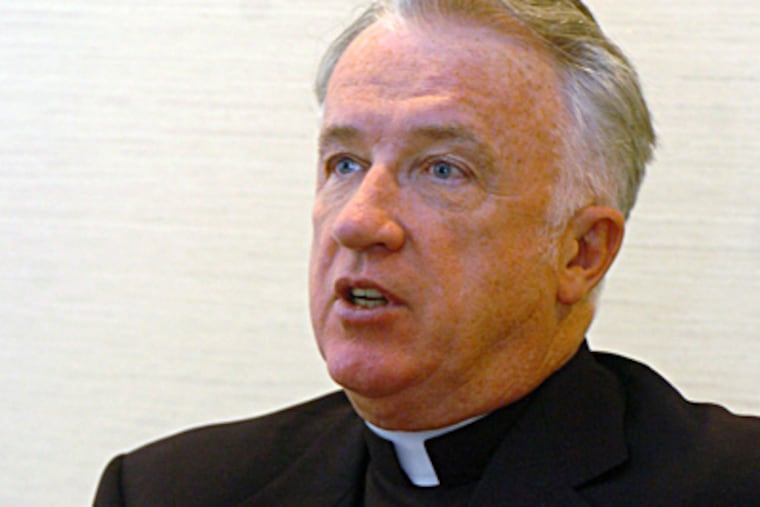Philly native and former W. Va. Bishop Michael Bransfield barred from serving in two dioceses
Michael J. Bransfield, who resigned as bishop in West Virginia in September, has been prohibited from serving as a priest in West Virginia or Baltimore, following an investigation into sexual harassment of adults and financial improprieties. Church officials are awaiting a ruling from the Vatican.

Catholic Church officials announced Monday that they had banned Roxborough native and former West Virginia Bishop Michael J. Bransfield from exercising “any priestly or episcopal ministry” in two dioceses after completing a preliminary investigation into allegations of sexual harassment and financial improprieties against him.
Bransfield, 75, stepped down in September as bishop of the Wheeling-Charleston Diocese amid claims that he had sexually harassed adults. Pope Francis appointed Baltimore Archbishop William E. Lori to handle the investigation and serve as a temporary administrator of the diocese.
In a statement Monday, Lori said the investigative team had examined “multiple allegations of sexual harassment” of adults and financial improprieties, and interviewed more than 40 people, including Bransfield. The team, which included five lay experts, completed a report and sent it to the Vatican for further action.
“Pending the assessment of the findings of the Holy See, as apostolic administrator of the Diocese of Wheeling-Charleston, I have directed that Bishop Bransfield is not authorized to exercise any priestly or episcopal ministry either within the Diocese of Wheeling-Charleston or within the Archdiocese of Baltimore,” he said.
Reached on his cell phone Monday, Bransfield declined to discuss the investigation in detail except to say he looked forward to being able to “speak for myself and defend myself” before church officials in Rome.
Speaking publicly for the first time since he stepped down, the prelate said: “This happened, but I retired first. I am a retired bishop of West Virginia, and my title is bishop emeritus of the Wheeling-Charleston Diocese.”
Bransfield said he was interviewed once by Lori’s team during the inquiry. He noted he was not privy to what information was sent to the Vatican, but said the investigators’ questions "were not, in my estimation, that formidable.”
Raised in a family of prominent Philadelphia clerics, Bransfield has been living in Philadelphia since the fall. He said he hasn’t returned to West Virginia since September.
Tim Bishop, spokesperson for the Wheeling-Charleston Diocese, which covers the entire state, said he had no additional information on the probe’s findings.
“In effect, the Vatican owns the investigation,” Bishop said. “No one at the diocese has seen it, nor do we have a copy of it.”
“Like everyone else … we await judgment from the Holy See,” Bishop added.
Bransfield’s resignation late last summer came after a wave of damaging reports involving Catholic bishops and sex abuse. It followed the release of a Pennsylvania grand jury report in August that accused church leaders of covering up decades of clergy sex abuse, and the ouster of Cardinal Theodore McCarrick, the former archbishop of Washington, amid criticisms that church leaders had ignored reports of his sexual misconduct or harassment.
Lori’s role in overseeing the Bransfield investigation mirrors a proposal that at least one ranking U.S. bishop raised during last month’s historic clergy sex-abuse summit in Rome. Cardinal Blase Cupich of Chicago urged his colleagues to empower him and other metropolitan archbishops to investigate sex abuse claims made against their colleagues in neighboring dioceses. Francis said church leaders would continue to consider changes and improvements that might make abuse victims more comfortable reporting allegations involving bishops.
After Bransfield stepped aside, a person familiar with the matter told The Inquirer that at least three priests had come forward with claims that Bransfield had subjected them to unwanted sexual advances and physical contact. A hotline set up subsequently drew more than 75 calls alleging misconduct in West Virginia, Washington, and Philadelphia that stretched back decades.
Bransfield was accused of sexual misconduct while a priest in Philadelphia. In 2007, a former student at Lansdale Catholic High School said Bransfield molested him when the priest was assigned in the late 1970s and early 1980s.
Instead of sending the claim to a civilian review board created to independently review allegations, church officials conducted their own investigation. Cardinal Justin F. Rigali, then the head of the Philadelphia Archdiocese, determined that the former student’s complaint was unfounded.
The archdiocese also forwarded the complaint to Montgomery County prosecutors, who opted not to bring charges.
In the 2012 child-endangerment trial of Msgr. William J. Lynn, a ranking administrator in the Philadelphia Archdiocese, two witnesses testified that Bransfield knew about the sexually abusive behavior years ago of a fellow priest and seminary classmate, the Rev. Stanley Gana. Through a spokesperson, he denied the claim.
No charges were filed against Bransfield, and the most recent investigation did not uncover any criminal activity.
Bransfield’s cousin Msgr. J. Brian Bransfield is a ranking officer of the U.S. Conference of Catholic Bishops. A nephew, the Rev. Sean Bransfield, is vice chancellor of the Archdiocese of Philadelphia.
Michael Bransfield previously served as president of the Bala Cynwyd-based Papal Foundation, one of the largest Catholic fund-raising organizations in the nation.